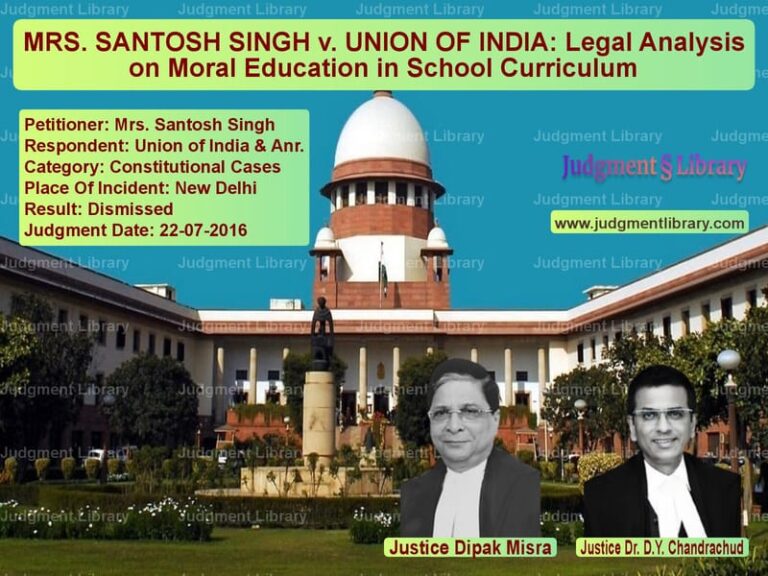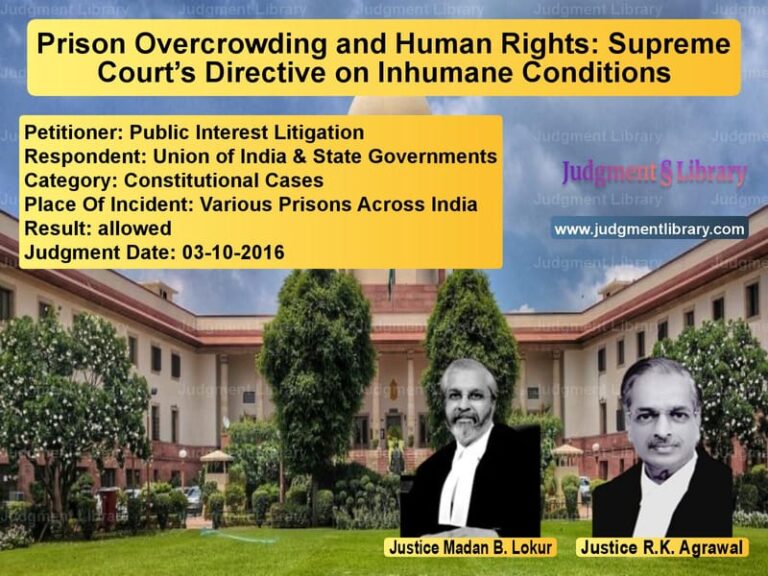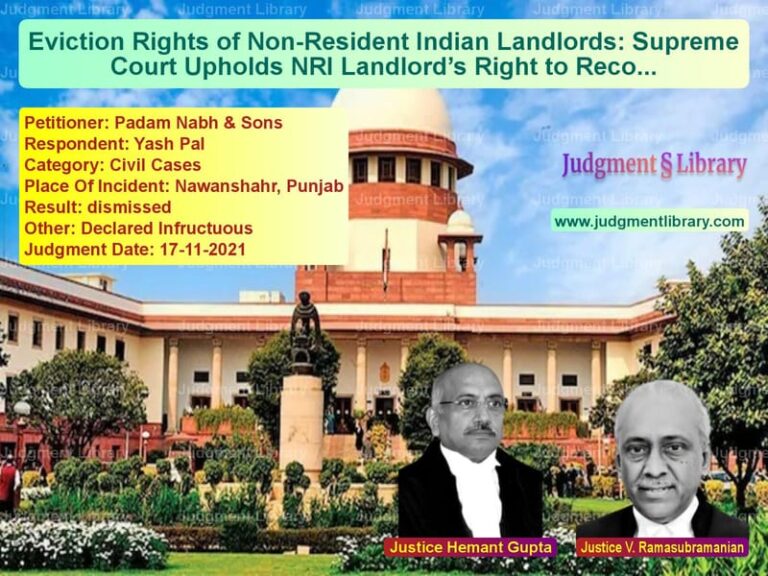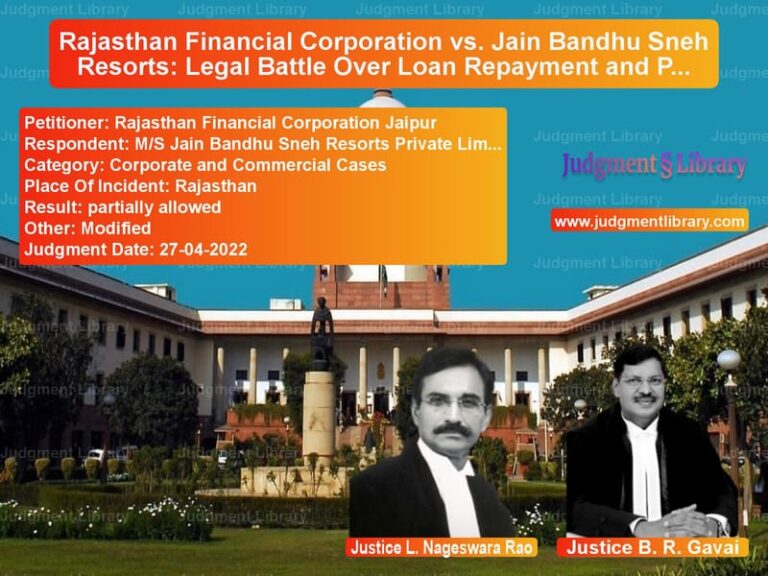Life Imprisonment and Remission: Supreme Court Orders Reconsideration in Convicts’ Case
The case of Jaswant Singh & Ors. vs. The State of Chhattisgarh & Anr. revolves around the question of premature release of convicts serving life imprisonment. The Supreme Court, in its judgment dated January 13, 2023, directed the state authorities to reconsider the remission applications of the petitioners, citing procedural lapses in the initial rejection of their requests.
Background of the Case
The petitioners, Jaswant Singh (aged 63), Ajay (aged 43), and Naresh (aged 57), were convicted under Sections 147, 148, 302/149, and 307/149 of the Indian Penal Code (IPC) and Section 3(2)(5) of the Scheduled Castes and Scheduled Tribes (Prevention of Atrocities) Act. They were sentenced to life imprisonment for their involvement in an unlawful assembly that resulted in the deaths of two individuals using deadly weapons such as swords, axes, and wooden sticks.
Having served approximately 16 years of imprisonment without remission (and 21 years with remission), the petitioners sought premature release under Section 432(2) of the Criminal Procedure Code (CrPC). Their applications were initially rejected by the Special Judge, Durg, without sufficient reasoning. The State of Chhattisgarh also refused remission, citing the judge’s opinion.
Legal Issues Examined
- Was the rejection of remission applications justified under the law?
- Did the sentencing judge provide adequate reasons for denying remission?
- What factors should be considered in deciding remission applications?
Petitioners’ Arguments
The petitioners contended that:
- They had already served a significant portion of their life sentences.
- The rejection of remission was arbitrary and lacked proper reasoning.
- Co-accused Ram Chander had been granted remission under similar circumstances.
- The sentencing judge’s opinion was not in compliance with the Laxman Naskar vs. Union of India guidelines.
Respondents’ Arguments
The State of Chhattisgarh argued that:
- The nature of the crime was severe, and remission should not be granted.
- The judge’s opinion should be given due weight in deciding remission.
- The appropriate government has discretionary power to deny remission.
Supreme Court’s Observations
The Supreme Court, comprising Justice Dinesh Maheshwari and Justice Bela M. Trivedi, observed:
“The opinion of the presiding judge shines a light on the nature of the crime that has been committed, the record of the convict, their background, and other relevant factors. However, an opinion accompanied by inadequate reasoning would not satisfy the requirements of Section 432(2) of the CrPC.”
The Court noted that the rejection letters from the Special Judge did not contain any discussion on the factors established in Laxman Naskar vs. Union of India for granting remission.
Factors for Remission Consideration
The Supreme Court reiterated the factors outlined in the Laxman Naskar judgment:
- Whether the offense affects society at large.
- The probability of the crime being repeated.
- The potential of the convict to commit crimes in the future.
- Whether continued incarceration serves any fruitful purpose.
- The socio-economic condition of the convict’s family.
The Court emphasized that these factors must be considered by the sentencing judge before forming an opinion on remission.
Final Ruling
The Supreme Court directed that:
- The remission applications of the petitioners must be reconsidered.
- The Special Judge, Durg, should provide a fresh opinion with detailed reasoning.
- The State of Chhattisgarh must make a final decision on remission within one month of receiving the judge’s opinion.
Implications of the Judgment
This ruling has significant implications:
- Strengthens Procedural Fairness: Ensures that remission decisions are based on well-reasoned judicial opinions.
- Precedent for Future Cases: Reaffirms that all remission applications must be assessed according to the legal principles laid down in Laxman Naskar.
- Impact on Life Imprisonment Sentences: Encourages a systematic approach to reviewing long-term prison sentences.
Conclusion
The Supreme Court’s decision in Jaswant Singh & Ors. vs. The State of Chhattisgarh is a crucial step in ensuring fairness in remission applications. By emphasizing the need for judicial reasoning and objective criteria, the Court has reinforced the principles of justice and reform in the criminal justice system.
Petitioner Name: Jaswant Singh & Ors..Respondent Name: The State of Chhattisgarh & Anr..Judgment By: Justice Dinesh Maheshwari, Justice Bela M. Trivedi.Place Of Incident: Chhattisgarh, India.Judgment Date: 13-01-2023.
Don’t miss out on the full details! Download the complete judgment in PDF format below and gain valuable insights instantly!
Download Judgment: jaswant-singh-&-ors.-vs-the-state-of-chhatti-supreme-court-of-india-judgment-dated-13-01-2023.pdf
Directly Download Judgment: Directly download this Judgment
See all petitions in Bail and Anticipatory Bail
See all petitions in SC/ST Act Case
See all petitions in Attempt to Murder Cases
See all petitions in Judgment by Dinesh Maheshwari
See all petitions in Judgment by Bela M. Trivedi
See all petitions in allowed
See all petitions in Remanded
See all petitions in supreme court of India judgments January 2023
See all petitions in 2023 judgments
See all posts in Criminal Cases Category
See all allowed petitions in Criminal Cases Category
See all Dismissed petitions in Criminal Cases Category
See all partially allowed petitions in Criminal Cases Category







